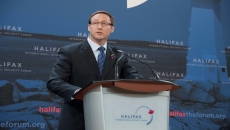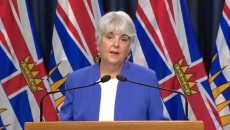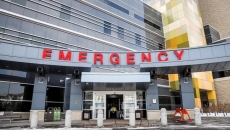Ontario's pediatric hospitals have updated their recommendations for a safe return to school full-time, offering guidelines on the logistical challenges facing educators this fall.
Among the key recommendations from doctors at Toronto's SickKids hospital and other health officials from across the province is that high-school and middle-school students wear masks when distance can't be maintained, however younger children aren't expected to wear them.
Dr. Jeffrey Pernica, the medical director of infectious diseases at McMaster University in Hamilton, says there's a "lack of evidence" on whether the routine use of masks in a school setting provides more benefit than harm.
"Being in school is not the same as going to a grocery store or restaurant and that is why the guidance should not necessarily be the same," he said.
Pernica says masks, when not worn correctly, may increase the chance of transmission rather than decrease it, and there are concerns with proper storage of masks when not in use.
They can also distract children and pose a barrier to communication by taking away non-verbal facial cues in speech, he said.
"Many adults find it challenging to wear masks for a full day so it seems unreasonable to ask children to do the same."
The doctors noted that their guidelines are based on current epidemiology. If that changes within a given region, the recommendations will also change.
While there have been recent talks of returning to school on a part-time basis, with distanced-learning supplementing the rest of the week, the doctors would prefer to see full-time, in-person schooling.
That would be best for children, from educational, mental health and social development standpoints, says Dr. Sloane Freeman of Unity Healthy Toronto.
Freeman says parents are already reporting a decline in the mental health of their children since being out of school since March, while behavioural problems have increased.
Freeman also pointed out how some children rely on school as a safe place.
"When children are not in school, there are fewer opportunities to monitor and identify children at risk of abuse and neglect," she said. "Another significant concern when we think about distance learning or educational disparities (is) children with socio-demographic risk factors face barriers to online learning."
Dr. Michelle Science of SickKids says "a bundle of measures" will eliminate risk of COVID-19 transmission within schools rather than one specific precaution.
Things like daily screening for symptoms, physical distancing when possible and cohorting younger children —keeping them with the same group throughout the day to eliminate mixing between classes and years — should also be in the return plan, she added.
Dr. Chuck Hui of the Children's Hospital of Eastern Ontario in Ottawa, says a distance of one metre instead of two might be enough among elementary-school students, though two metres is still ideal among older kids.
"It's difficult to enforce distancing during important developmental play in younger children."
Screening, whether done by a parent at home or someone on school grounds, would help make sure sick kids aren't coming to class in the first place, Science said. Hand hygiene and environmental cleaning are other important safety measures.
The doctors say evidence is mounting that young children don't play a "significant role" in spreading COVID-19, compared to teenagers and other adults. They also say young children may be less susceptible to getting the infection in the first place.
Dr. Ronald Cohn, the president and CEO of SickKids, says multiple reports around the world suggest children account for 5 to 10 per cent of COVID infections. The 0-19 age range is represented in 7.5 per cent of infections in Canada.
Teenagers, however, seem to spread the disease at a similar rate to adults, Cohn added, which is why the doctors included mask-wearing recommendations for high-school students and teachers when distance can't be followed.
While young children are likely to experience mild or no symptoms, a multi-system inflammatory syndrome could be related to the novel coronavirus, Cohn said. But he notes that condition is "extremely rare" and treatable.
"It is, however, important to emphasize that we are still lacking conclusive data, especially as it relates to the transmission of COVID in children," Cohn said. "And we need to carefully watch and evaluate emerging evidence."
Cohn says they've had "open and constructive dialogue" about reopening schools with the Ontario government, which is expected to unveil its plan for a return to school in the coming days.
Wednesday's document came six weeks after SickKids unveiled its initial recommendations, and five weeks before the school year is set to begin.
Ontario Premier Doug Ford said Wednesday getting children back to school safely will be a "tough challenge."
"Everyone's nervous when you're dealing with kids," he said. "There's going to be two million kids going back to class, and (about) 140,000 teachers — that's concerning."
Dr. Ari Bitnum of SickKids says there's "no question" schools are going to need more resources — like employing screeners and more teachers — for the recommendations to work.
Science said employers should put in place supports for parents to stay home when they have a sick child. That would extend to school staff as well, she added.
Cohn said a full-time, in-person return to Ontario schools in September can only happen if the prevalence and transmission of COVID-19 in the community remains low.
Placing an exact number of what the rate of transmission should be before reopening, or before having to close down again, is hard to do, however.
"We should focus on ... putting out fires as they come up, rather than shutting down everything based on a specific number," said Bitnum. "You could have a scenario, for example, where there's 300 cases in a particular small region and the attention needs to be focused on that region rather than the province as a whole.
"I think the strategy of robust testing and mitigation when local outbreaks occur is a strategy we should aim for."






